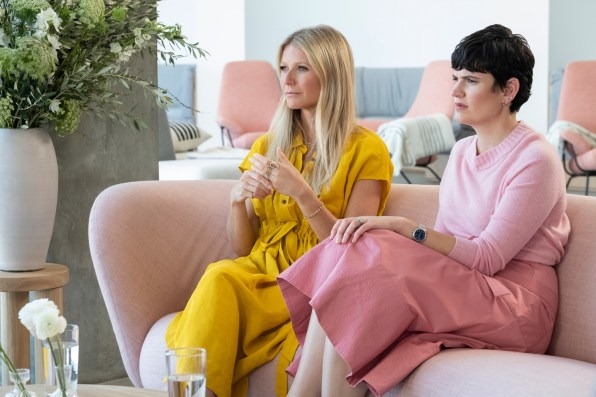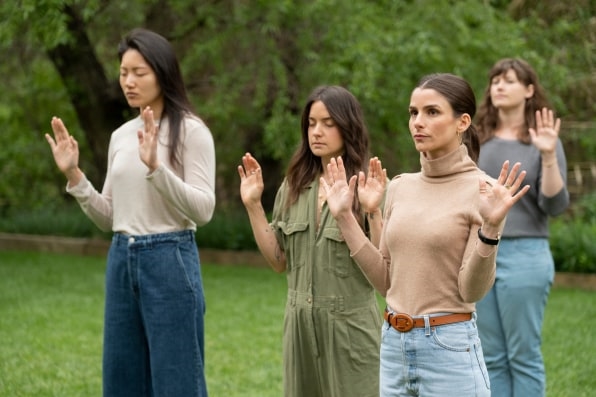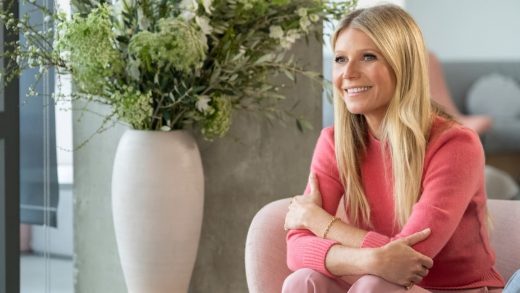Goop claims Gwyneth Paltrow’s new Netflix show offers ‘tons of scientific proof’
Since its launch in 2008, Gwyneth Paltrow’s lifestyle brand, Goop, has grown from a homespun newsletter into a multipronged empire.
Riding the wave of the $4.5 trillion wellness industry, Goop has launched its own line of clothing and skincare, hosted experiential events and summits, opened brick-and-mortar locations, and produced podcasts and products for men, all of which have contributed to the company’s reported $250 million valuation.
But despite Goop’s success, the company has been bombarded with criticism for allegedly promoting dangerous pseudoscience and peddling products that have been called modern-day snake oil. From essential oils that were supposed to cure depression to those infamous jade eggs, Goop has been raked over the legal coals and paid out a 2018 settlement of $145,000 stemming from unfounded claims about several of its products. The company also regularly saunters in front of the internet firing squad with products such as the “This Smells Like My Vagina” candle.
Paltrow admitted to making “a few mistakes back the early days,” and the company has since started issuing disclaimers and staffed an in-house team of scientists and regulators.
It’s evident from Goop’s massive following and continued growth that the company has struck a chord. But it also hasn’t been able to shake its image of shilling half-baked scientific claims to women who have time and money to waste on unproven, out-there wellness therapies.
And that’s where The Goop Lab comes in. Debuting January 24, the six-episode Netflix series unpacks the claims and purported benefits of fringe practices and methods across the wellness spectrum. It’s like a deep dive into a Goop article with emotional narratives woven throughout that Elise Loehnen, chief content officer at Goop and executive producer of The Goop Lab, hopes will change people’s minds about the company.
“I know that the people who are big fans of the brand will love the show and feel like they’re able to go a little bit deeper on some of these topics that they’re already familiar with,” Loehnen says. “But my hope for the show is that for all the people who have heard of us through some big media moment that’s probably not that emblematic of who we really are as a brand [will think about us differently]. It might inspire them to examine their own triggers.”
Each episode is comprised of three elements: Paltrow and Loehnen interview the expert or lead practitioner of the topic at hand, Goop employees try the method out, and people outside of the company who’ve benefitted from it discuss their experiences.
There are emotional breakthroughs, such as one Goop employee processing her father’s suicide through psychedelic psychotherapy. There are heartwarming testimonials, including one man who claims he overcame an autoimmune disorder through deep breathing exercises and cold water immersion.
But what there isn’t is a critical voice.

[Photo: courtesy of Adam Rose/Netflix]
There are no objective experts offering a broader (or legitimately scientific) perspective on the topic of discussion, nor are there any people who describe a less than desirable outcome from any of the procedures. One could argue that having a well-informed naysayer in the mix could lend a bit of much-needed credibility to the practices that the Goop brand promotes. There is a disclaimer at the beginning of each episode that states: “The following series is designed to entertain and inform—not provide medical advice. You should always consult your doctor when it comes to your personal health, or before you start any treatment.” But that’s it. The rest of the show focuses on only success stories, which, Loehnen explains, is by design.
“We didn’t want it to be a show about Western medicine versus Eastern medicine. We just don’t believe in any of those dichotomies. We believe that the best exists in both worlds, particularly when used in combination,” she says. “And so we felt like we would be manufacturing drama by trying to find a detractor. We knew that that would exist in the culture and it would be part of the conversation around the show.”
And, oh, what a conversation it’s been.
The Goop Lab has, unsurprisingly, received some scathing reviews from at least two medical doctors. One called it “a platform for junk science, gibberish, and unproven health claims,” and another charged it with pushing “potentially harmful therapies for attention, with the disclaimer of ‘We’re only having conversations!’” The trailer for the show currently has 17,000 dislikes, compared to only 1,600 likes, on YouTube. And Twitter naturally had a field day with the poster image for the unsubtle but humorously self-aware poster for the show, which someone described as “Georgia O’Keeffe meets Looney Tunes.”
Gwyneth Paltrow welcomes you to The Goop Lab on January 24 pic.twitter.com/ZzeEEbAy9L
— See What’s Next (@seewhatsnext) January 6, 2020
Loehnen rejects the notion that The Goop Lab is selling pseudoscience. She claims that the topics discussed on the show have “tons of scientific proof” that scientists would “back us up on” and that the more out-there methods shouldn’t be dismissed solely because they fall outside of the general scope of more common medical practices.
“In the energy healing episode, we have no idea what’s happening, but this experience seems to be real. Just because we lack the language to explain it, it doesn’t mean that it didn’t happen,” Loehnen says. “That that’s one of the things that so many women in particular have struggled with. Our experience is reduced to hysteria. ‘It’s all in your head. There’s nothing wrong with you.’ And so I think people are tired of having their experience rejected or ignored.”

“There are ancient modalities that aren’t in the interests of the pharmaceutical interests that help a lot of people,” Loehnen continues. “And so saying they’re not real or they’re fake is kind of insulting. But we’re really careful, and we’ve learned a lot of lessons over the years not to make claims without having all the substantiation to back it up.”
Ultimately, The Goop Lab wants to give an emotional arc to the more uncharted wellness methods by attaching real faces and stories to them. And, yes, Loehnen and Paltrow want to start a conversation.
“Pretty much since I started [at Goop six years ago], the idea of a show has been kicked around. But only in the last two years did we feel like it was something that, as a company, we were big enough and established enough to support,” Loehnen says. “It took us a minute to figure out how to make good TV, but also continue to retain that place of just asking questions and letting the experts shine and not presenting ourselves as experts, which is something that we try to never do. We just really want to be the conduit for the conversation.”
(17)



